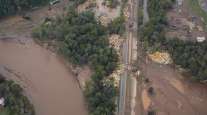Lack of Consensus Is Roadblock for S.C. Highway Funding
Some lawmakers want to use most of the state's $1.3 billion surplus on highway projects. Several would be willing to consider an increase in the state's 16-cents-per-gallon gas tax that would partially be offset by a reduction in income taxes. Others say the top priority should be reforming the South Carolina Department of Transportation.
The range of opinions that local lawmakers and candidates expressed in interviews Jan. 29 illustrates why Statehouse leaders are struggling to move ahead on what widely is seen as the year's top legislative issue.
There is broad agreement that "our roads need to be fixed," said Rep. Brian White. The Anderson Republican is chairman of the state House of Representatives Ways and Means Committee.
The problem, White said, "is everybody has got an idea" about how to pay for highway projects.
White supports a bill that the House passed last year that would have boosted the state's gas tax by 10 cents a gallon. The legislation would have generated $427 million annually for roadwork while cutting the average resident's income tax bill by $48 a year. The bill also would have given the governor authority to appoint the transportation department's governing board.
"The House plan is a good plan," White said.
Senators were unable to agree on a road funding strategy last year, and lawmakers ultimately approved a one-time, $216 million appropriation that was divided among the state's 46 counties. About $7 million of that money was allocated to Anderson County.
Senators are expected to resume their road-funding debate next week. The latest proposal that they are considering would raise $665 million by increasing the state's gas tax by 12 cents over three years, along with other fees. The plan includes $400 million in tax relief. Senators also are mulling competing proposals involving the makeup of the governing board for the state DOT.
The Senate plan and last year's House bill fall short of the additional $1.2 billion that is needed yearly to fully fix South Carolina's network of roads and bridges, said Christy Hall, the state's interim transportation secretary.
Sen. Kevin Bryant (R-Anderson) said he will not vote for a gas-tax increase in a year when the state has a large budget surplus.
"There is no need to raise anybody's taxes," said Bryant, who instead favors allocating most of the $1.3 billion surplus to county transportation committees.
Rep. Jonathon Hill (R-Townville) agrees with the strategy of devoting surplus money to highway projects. He said he also wants to eliminate the DOT governing board, a move that would give the state's governor unfettered control of the agency.
Rep. Mike Gambrell (R-Honea Path), who is chairman of the county's legislative delegation, voted for the House roads bill last year. But he said Jan. 29 that he is more reluctant to support a gas-tax increase when the state has a sizable surplus.
Gambrell is one of four Republicans running for the Senate District 4 seat that became vacant when Sen. Billy O'Dell died last month. The seat will be filled by the winner of a special election set for May 17, just two weeks before the ongoing legislative session is scheduled to end.
Williamston Town Councilman Rockey Burgess, who also is running for the Senate 4 seat, said he believes the state's surplus should be spent on increasing funding for public schools and fixing roads. Like Hill, he also favors eliminating the DOT governing board.
Critics contend that spending this year's surplus on roads represents only a short-term solution.
White argued that the state needs a recurring source of revenue for road projects.
Carole Burdette, the former Pendleton mayor who is running against Bryant, agrees with that approach.
"We need a long-term strategy," she said.
Greenwood attorney Tripp Padgett, who is running for the Senate District 4 seat, said he would support a gas-tax increase that would be offset by lower income taxes.
Senate District 4 candidate Willie Day, who is the city of Anderson's former neighborhood and transit director, said his first priority would be reforming the DOT. He wants to prevent influential lawmakers from unfairly diverting road money for projects in their own districts.
Despite the current lack of consensus, the leader of a nonpartisan organization backed by business interests predicted that lawmakers will succumb to public pressure and pass a road funding bill this year.
"People are just sick and tired of driving on bad roads," said Bill Ross, executive director of the South Carolina Alliance To Fix Our Roads.




